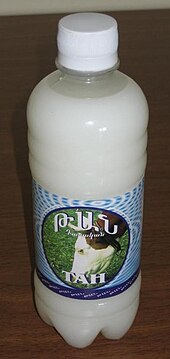| Revision as of 09:34, 16 February 2014 editGrayfell (talk | contribs)Extended confirmed users, Pending changes reviewers83,111 editsm Undid revision 595705357 by 95.9.235.112 (talk) It doesn't work that way← Previous edit | Revision as of 09:36, 16 February 2014 edit undoGrayfell (talk | contribs)Extended confirmed users, Pending changes reviewers83,111 editsm MOS:LEADNext edit → | ||
| Line 1: | Line 1: | ||
| ⚫ | {{Merge to |Ayran |discuss=Talk:Ayran#Merge |date=June 2013}} | ||
| {{for|the village in Iran|Doogh, Iran}} | {{for|the village in Iran|Doogh, Iran}} | ||
| ⚫ | {{Merge to |Ayran |discuss=Talk:Ayran#Merge |date=June 2013}} | ||
| ], ]]] | ], ]]] | ||
Revision as of 09:36, 16 February 2014
For the village in Iran, see Doogh, Iran.| It has been suggested that this article be merged into Ayran. (Discuss) Proposed since June 2013. |

Doogh (Template:Lang-fa Persian pronunciation: [duːɣ]; Iraqi: شنينة Shinēna) is a savory yogurt-based beverage. Popular in Iran, Afghanistan, Azerbaijan, Armenia, Iraq, Syria. it is sometimes carbonated and seasoned with mint. Outside of Iran and Afghanistan it is known by different names.
History
Doogh has long been a popular drink and was consumed in ancient Persia (modern-day Iran). Described by an 1886 source as a cold drink of curdled milk and water seasoned with mint, its name derives from the Persian word for milking, dooshidan. By 2009 it was being referred to as a "minted yogurt drink".
Variations
Salt (and sometimes pepper) is added, and commonly dried mint or pennyroyal is mixed in as well. One variation includes diced cucumbers to provide a crunchy texture to the beverage. Some varieties of doogh lack carbonation.
See also
References
- ^ Islamic Republic of Iran (26 - 29 January 2009). Project Document for a Regional Standard for Doogh (CX/NEA 09/5/8) (PDF). Tunis, Tunisia: United Nations. Joint FAO/WHO food standards programme of the FAO/WHO coordinating committee for the Near East. Retrieved 26 June 2011.
{{cite conference}}: Check date values in:|date=(help) - Simmons, Shirin (2007). Treasury of Persian Cuisine. Stamford House Publishing. ISBN 1-904985-56-4.
- Grosart, Alexander (17 July 1886). "Soor-doock" and "doogh". The Academy and literature. Vol. 30. Blackburn. p. 59.
{{cite book}}: CS1 maint: location missing publisher (link) - Dickerman, Sara (June 4, 2009). "Persian Cooking Finds a Home in Los Angeles". The New York Times. Retrieved June 27, 2009.